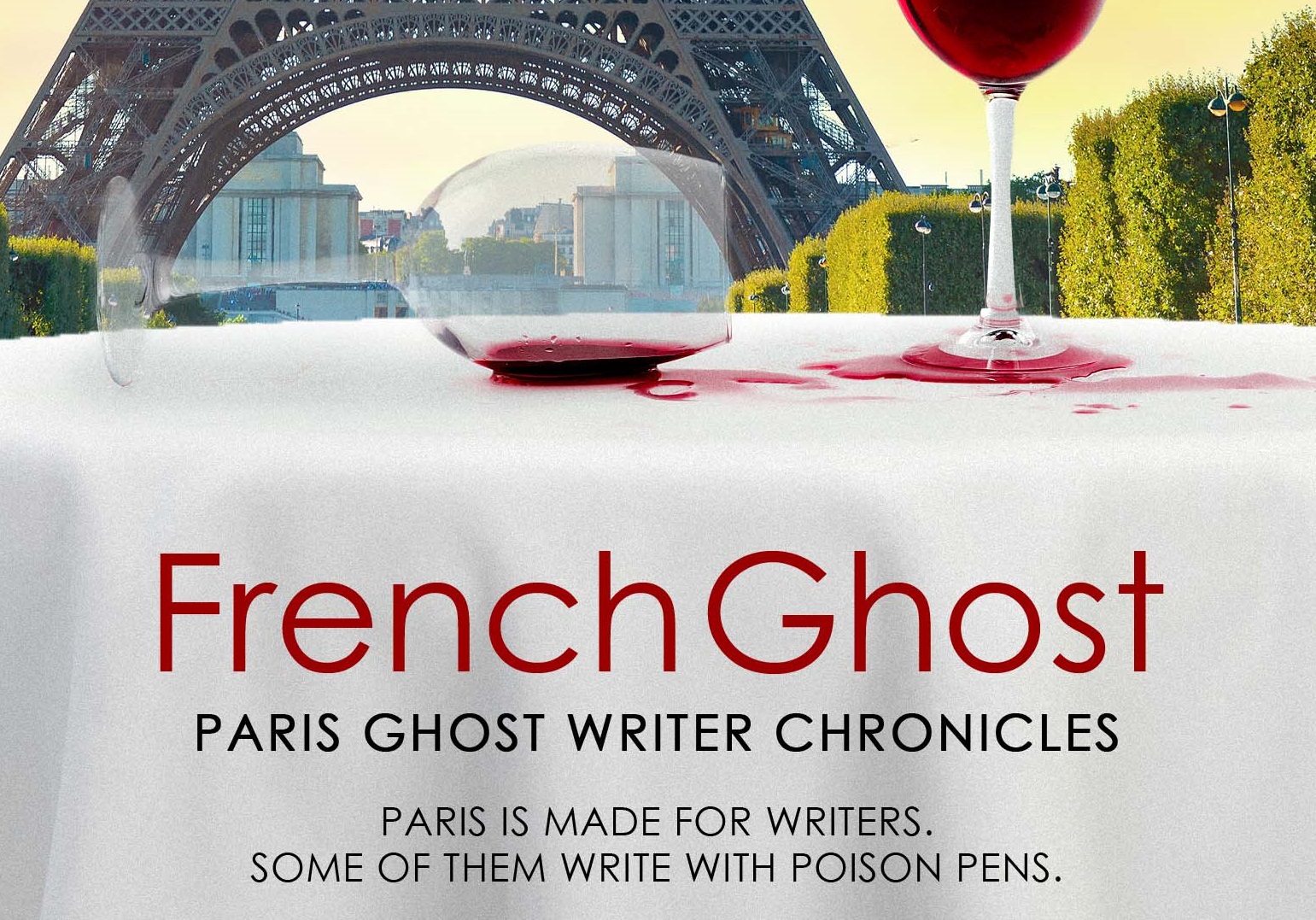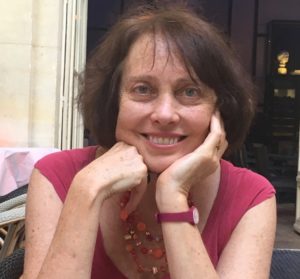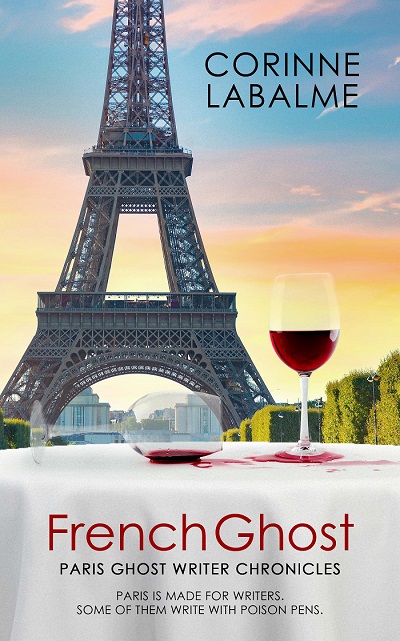
Good travel writing involves relating pertinent facts, observations and experiences, something that Corinne LaBalme has been doing with much success for decades, including through her numerous contributions to France Revisited.
Yet travel writers also dream of occasionally breaking out from the truth and using their knowledge of people, culture and place as the background for the enjoyment and conflicts of fictional character. Some then go on to produce stories and novels of great seriousness and psychological drama. Others prefer a lighter touch, as Corinne does in her new novel French Ghost, a romantic cozy mystery published in January 2022 by The Wild Rose Press.

French Ghost is the first of a three-part series featuring Melody Layne, an American ghost writer who gets stranded in Paris when the over-sexed, unloved French movie star who hired her to ghostwrite his memoir accidentally (or not) drowns before the interviews begin. A tall, dark and sexy Spaniard then offers her an alternative book contract, and more, leading Melody on a quest for truth and near-truth that leads her throughout Paris as well as to Rouen, Vichy, Bordeaux, Dijon and Cannes, with lots of Chardonnay, pains au chocolat, fine dining and some steamy romance along the way.
Corinne previously published Temporary Engagement, a New York-based romance published under the penname Cairenn Lawless.
Gary Lee Kraut interviewed Corinne LaBalme about her new book and the place of travel and travel writing in her novels.
What does your travel writing have in common with the romance and cozy mystery that you also write? And how does the former feed into the latter?
Travel writing is like a treasure hunt. It’s a quest, and what’s more romantic and mysterious than the time-honored quest narrative? Even if the quest of the editorial assignment can be as prosaic as hunting for “The Five Best Hotel Breakfasts in Bordeaux,” it still qualifies as a quest. Who knows what’s hiding in that innocent-looking jar of razzleberry jelly? Usually, it’s just razzleberries, but you’re there, on the scene, to investigate that jam, taste it, and report on it.
Until the 21st century made fake news into a dangerous art form, telling the truth (or aiming to tell the truth) has been the cornerstone of journalism. It’s always been my goal, even when doing recon for an article about crepes in Paris.
That’s why fiction is such a relief. You’re no longer constrained by facts. Fiction isn’t about what happened, it’s about the infinite possibilities of what might have happened. In French Ghost I was able to take facts that I’ve gleaned as a travel writer and use them as the background or décor for the fictional story that takes place in France.
French Ghost mostly takes place in Paris, but Melody Layne becomes quite the traveler over her first few months in Paris. She goes to Rouen, Vichy, Cannes, Bordeaux and Dijon. Why did you choose those cities in particular?
 I’ve spent years as a travel writer, freelancing for the New York Times, for the luxury destination newsletter La Belle France, and now for the very congenial France Revisited. These are all cities that I’ve visited and written about. Paris is where I live but during lockdown, I used this book to “virtually” revisit so many French towns that I’ve written about for magazines. I missed them!
I’ve spent years as a travel writer, freelancing for the New York Times, for the luxury destination newsletter La Belle France, and now for the very congenial France Revisited. These are all cities that I’ve visited and written about. Paris is where I live but during lockdown, I used this book to “virtually” revisit so many French towns that I’ve written about for magazines. I missed them!
I especially wanted to highlight Vichy in this book. It’s had a very bad rep since WWII when it was the seat of the Pétain government but the town is really worth a visit. Vichy has been a resort for over 2,000 years (the Roman legions were especially fond of its healing waters) and the royals and uber-rich riff-raff who built stately pleasure domes around the spa spared no costs in their efforts to out-do the tsars next door. The main avenues are flanked by a delightfully flamboyant medley of overblown pagodas, ginger-breaded castles, Moorish haciendas, Gothic gargoyles and turreted fortresses.
Yes, I especially enjoyed the descriptions of the Napoleon III Festival in Vichy and of the Cannes Film Festival ? Were they as fun to write as they were to read?
I didn’t get to attend the festival in Vichy on my last trip there—wrong season—but there were posters and reminders about it everywhere. The festival was perfect for my purposes: I wanted Melody to preen in fancy dress and give history professor Carlos an opportunity to display his knowledge of Napoleon III and Empress Eugénie.
I also enjoyed writing about the Cannes Film Festival which, let’s face it, is just a snotty trade fair with celebs walking around in borrowed evening gowns in broad daylight. Taneesha, my character who freelances for a Hollywood studio, is based on a Belgian friend who babysits hapless American movie stars in France. And I really enjoyed writing about Charlene Trent, the booze-challenged, silicon-enhanced B-movie actress who’s in Cannes to promote Beach Zombies III. Charlene is crude, class-less, but she’s a gas.
Did you have to do much additional research for French Ghost beyond what you already knew?
I love research, but books 1 and 2 of this trilogy treat facets of French life—food, fashion, cinema—that I know quite well. However, for Book 3, I am definitely all over the internet map trying to figure out what makes an influencer hot.
Will Melody continue to introduce readers to various regions and aspects of France in books 2 and 3? Without giving too much away, what can you tell us about them?
Melody’s big trips in Book 2 take her to Switzerland, specifically Vevey and Geneva. She does something on the shores of Lac Leman that I did myself many years ago. I guess I inspired myself on that little episode.
Your protagonist occasionally pals around with a well-known food writer who seems to be dining out every day, everything from high gastronomy to fancy pizza. Is she based on anyone you know? Do you enjoy restaurant writing?
Jenna Bardet, the food writer, is based on little old moi. While I was writing for La Belle France, I spent two weeks on the road each month reporting on hotels and restaurants and the other two weeks writing about those experiences. I really enjoyed it at the time, but now I’m rather glad to be writing about something other than pea soup and grilled grouse. I’ve also become a bit too vegetarian to do that job well anymore.
Do you like Chardonnay and pains au chocolat as much as Melody Layne does?
Yes on Chardonnay. No on the pains au chocolat. I’ve never been wild about French breakfast pastry. Correction: I used to like croissants. Years ago, the bakeries sold two kinds of croissant: curled-up ones baked with lard and straight ones (more expensive) baked with butter. The ones made with lard were much lighter and fluffier but they went out of style. Those lard croissants, if I could taste one now, would be my personal Proustian madeleine.
The Wild Rose Press will be publishing another romance of yours outside of this series. Does it take place in France?
Summer People, which will hopefully on the bookshelves by July, is a Cape Cod mystery-romance that takes place in Brewster, Massachusetts. Like my fictional writing about France, those are places that I know well since I spent most of my childhood vocations on Cape Cod. The protagonist, an antique collector who’s got a statue with some rather murky provenance at her gallery, doesn’t much care for Europe. She’s got a French-Canadian accent, and a rude concierge at a Monte Carlo hotel once made fun of it. That woman sure does hold a grudge.
French Ghost by Corinne LaBalme, available in ebook and paperback. Published by The Wild Rose Press. Available from your preferred online booksellers and select bookshops.
Temporary Engagement by Cairenn Lawless (aka Corinne LaBalme), available in ebook and paperback on Amazon, on ebook only on Barnes and Noble and Kobo.
Corinne LaBalme’s numerous contributions to France Revisited can be found here, with more on the way.
© 2022, France Revisited.

